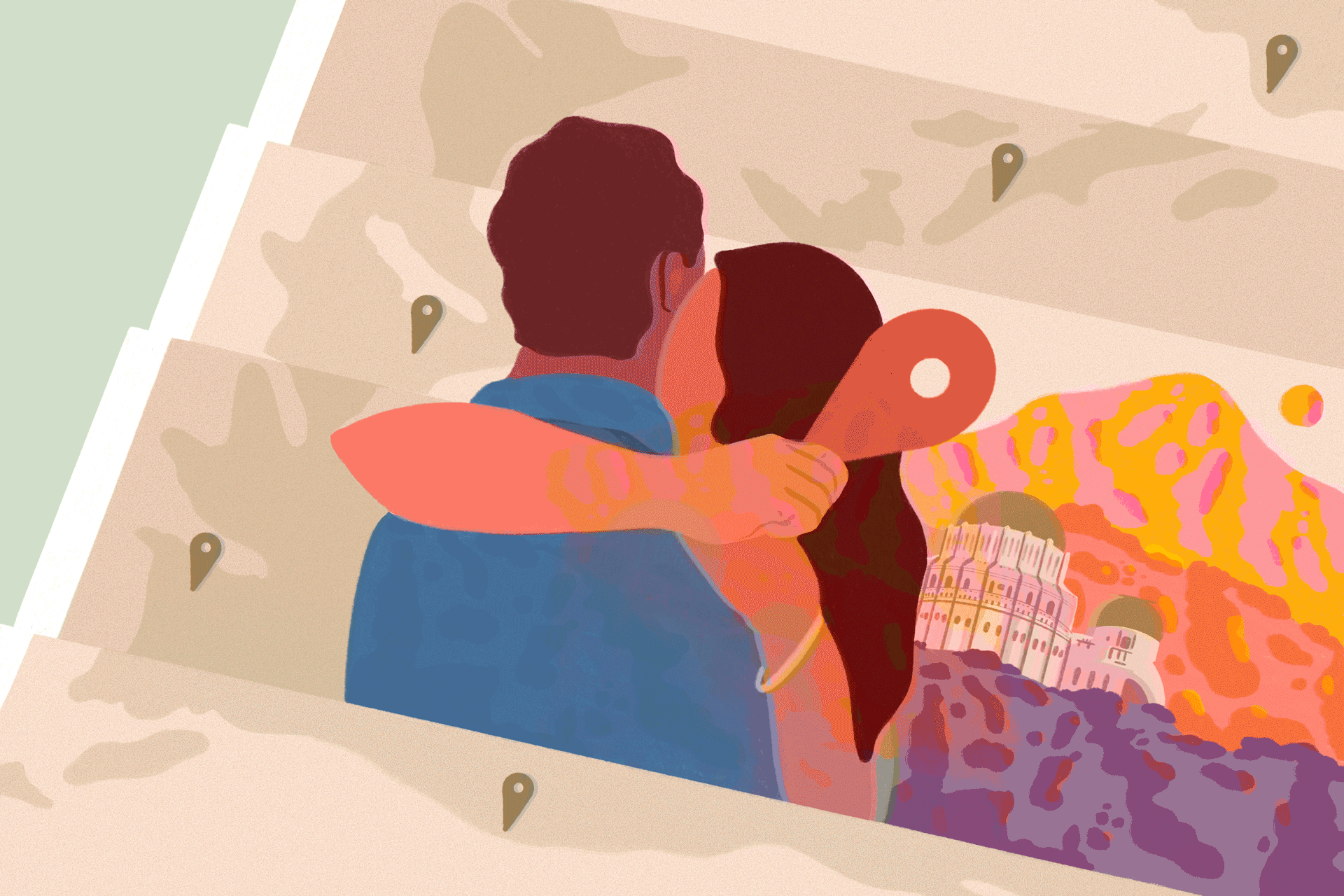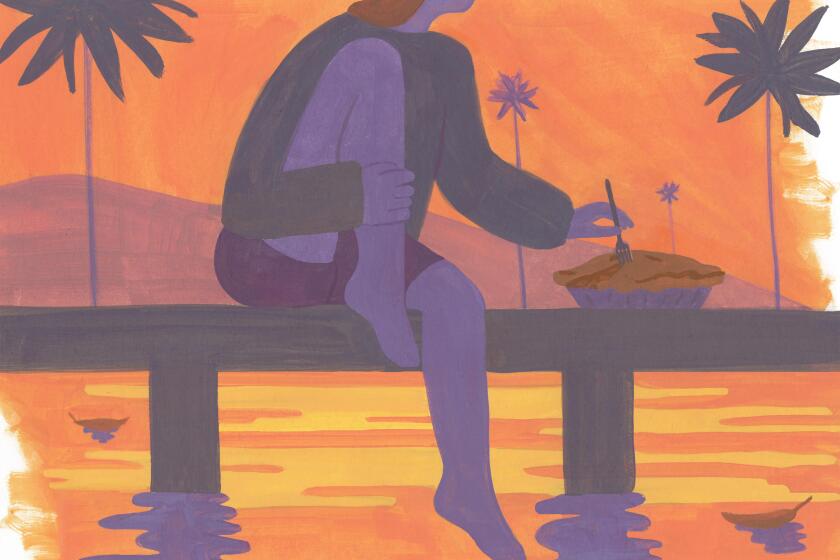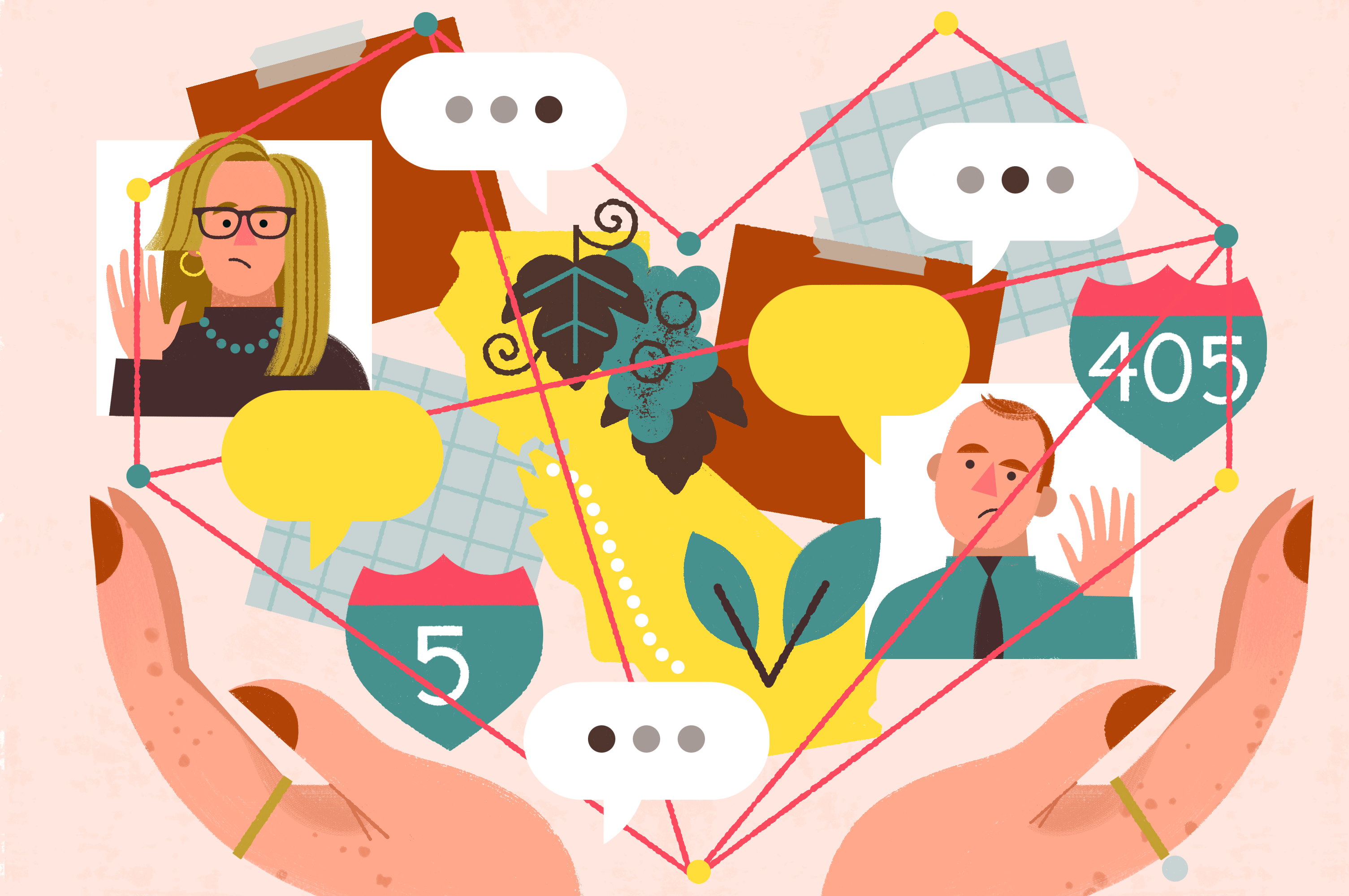L.A. Affairs: We both had jobs and kids. Could we wait until Date 6 for a kiss?
Hwarim Lee / For The Times
- Share via
At the end of my second date with Jonathan, we stood by a spiky dragon tree on Montana Avenue in Santa Monica and hugged. I felt that familiar fluttering, that internal lurch of desire.
As I biked toward my bungalow in the crisp, ocean air, I thought, Well, he may be a vegan baffled by the notion of a gym membership, whereas I pride myself on eating any dish from any nation and I once entered a bodybuilding contest. But the sexual part will definitely work, should this become an ongoing thing.
I wouldn’t be testing that hypothesis anytime soon, however, because after spending the pandemic streaming 16-episode Korean romance-dramas night after night with my preteen son, my dating style has been reset. The characters on the shows we watch rarely kiss until Episode 6 — a detail I texted Jonathan that night, in response to his text saying he had wanted to kiss me.
When I was in my 30s and working as a fashion editor in Hong Kong, a friend in Los Angeles called. He said, ‘I’ve met your soul mate. I’ve met the man you’re going to marry.’
Mine was a tequila-influenced, late-night text, but apparently it sounded like a dating policy, “The Korean TV Drama Guide to Dating.” Jonathan responded, “Well, I need to see you another four times!”
And we were off, on a game-show-like approach to re-virginized midlife dating. If you set limits on physical love, it turns out, getting to know each other takes on real urgency. We both had jobs and kids. How quickly could we reach Date 6?
I knew my life had been influenced by the soft power of hallyu, the Korean wave of government-sponsored pop culture. But I hadn’t quite realized how much I — a 55-year-old divorced mother living a couple thousand miles from my family — missed an old-fashioned, family-involved, chaste approach to love.
Here’s how romance works on a 16-episode Korean drama: Two lonely, impeccably dressed 30-year-olds meet, both wearing makeup and lip gloss, even the men. Especially the men. They realize they knew each other in childhood. (“Let’s Eat.” And “True Beauty.” And “Rain or Shine.”) They meet each other’s siblings and parents. They do an act of service (“Because This Is My First Life”). Then they kiss in Episode 6, break up several times through a series of misunderstandings because, let’s face it, 16 episodes is a lot of time to fill. Finally, they wind up together in a cheery, friendship-fueled, super-sexy future.
My friend from home suggested his newfound L.A. community would be the answer to my feeling lonely in the city post-breakup at Thanksgiving. Was I visiting a cult?
In real life, of course, overly prescribed roles can cause real anguish. Also, some characters on the shows I love battle ongoing patriarchy. But as research on divorce shows, second marriages often fail, perhaps due to maintaining the same attitude that didn’t work the first time around. So, this time, I was trying something new, a more traditional tack to love, which may be almost as trendy as liking K-pop, I realize.
Date 3: Jonathan and I co-work at a coffee shop near my house with 20-somethings almost chic enough to be in a Korean drama. I can’t concentrate because I’m thinking about kissing him.
Date 4: We meet at a vegan restaurant. Hug goodbye. I toss and turn all night.
Date 5: He drives to my place for coffee in the afternoon. We sit on the white, squashy couch on my glassed-in front porch, watching passersby watching us. “Nothing to see here, folks! It’s just Date 5.”
As Date 6 approaches, I suggest a free outdoor concert in Gandara Park, thinking that lying on a blanket might help facilitate the big K-drama kiss. In the past, I often worried if a guy liked me; now my calculation is different — more like, How can I help this relationship work? How can I help him look good to me? This approach comes more from experience than from TV. I’ve been married, to a man I still love and admire. While I don’t believe that any two people can force the wrong relationship to go right through delayed gratification based on an off-the-cuff comment about Korean pop culture, I do think that any two people can probably make a good relationship go bad.
Date 6: Jonathan brings two bags’ worth of picnic supplies. He’s nervous, he says, about getting it right. He has also been married, also conscious that successful love may take attention — and intention.
We spread a Mexican-style blanket and stretch out. The wine is chilled, the air sultry for Santa Monica, vibrating with a West African beat. I wait for him to kiss me.
I wait.
Aunt Sandy appointed herself matchmaking commander in chief after my mom died. She would prefer that I find love and happiness in Los Angeles instead of the Bay Area.
The concert ends. Having sex on the first date may be less nerve-wracking than prolonging the first kiss. We fold the blanket. “Do you want to take a walk?” I ask.
We stroll under the fig trees in Ocean Park, stepping over chunks of sidewalk thrust up by roots. He didn’t kiss me. We drive back to my place. After exiting the car, I finally snap. “Are you afraid to kiss me?”
He grabs me, and we kiss, leaning against the car. Then we walk to Palisades Park and make out by the concrete balustrade separating the cliff from the ocean. I’ve never made out in Palisades Park in all my time in L.A. After many years of singledom, romance and desire can feel like features of the past. This feels new and novel — and hopeful. I finally have to pull away and remind us that we’re in public.
In keeping with the Korean drama ethos, I won’t share details about Date 7. But let me just say, if you front-load emotional intimacy, letting the physical part run to catch up, you can build enough trust and connection for un-self-conscious abandon in the bedroom that could only be shown on a more X-rated network. I feel lucky to be this age and dating, drawing on a wealth of experience, some maturity ... and streaming TV.
The author spent the pandemic getting a master’s degree in social work and currently writes about aging for Inside Philanthropy. She is also the author of “Splitopia: Dispatches From Today’s Good Divorce and How to Part Well” and lives in Santa Monica with her son and her rescue dog, Marshmallow. Learn more about her on LinkedIn: linkedin.com/in/wendyparis
L.A. Affairs chronicles the search for romantic love in all its glorious expressions in the L.A. area, and we want to hear your true story. We pay $300 for a published essay. Email [email protected]. You can find submission guidelines here. You can find past columns here.
More to Read
Sign up for The Wild
We’ll help you find the best places to hike, bike and run, as well as the perfect silent spots for meditation and yoga.
You may occasionally receive promotional content from the Los Angeles Times.













